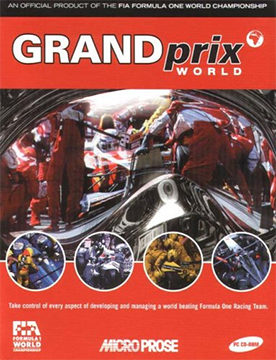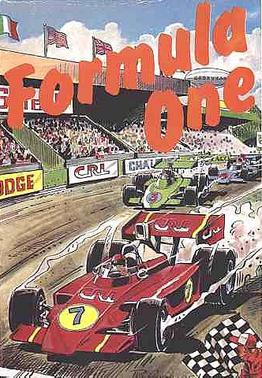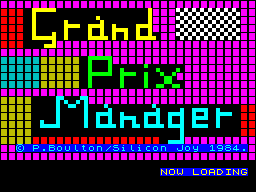
Williams Grand Prix Engineering Limited, currently racing in Formula One as Williams Racing, is a British Formula One team and constructor. It was founded by Sir Frank Williams (1942–2021) and Sir Patrick Head. The team was formed in 1977 after Frank Williams's earlier unsuccessful F1 operation, Frank Williams Racing Cars. The team is based in Grove, Oxfordshire, on a 60-acre (24 ha) site.

Jacques Villeneuve is a Canadian former racing driver, who competed in Formula One from 1996 to 2006. Villeneuve won the Formula One World Drivers' Championship in 1997 with Williams, and won 11 Grands Prix across 11 seasons. In American open-wheel racing, Villeneuve won the IndyCar World Series and the Indianapolis 500 in 1995 with Team Green.

Joseph Gilles Henri Villeneuve was a Canadian racing driver, who competed in Formula One from 1977 to 1982. Villeneuve was runner-up in the Formula One World Drivers' Championship in 1979 with Ferrari, and won six Grands Prix across six seasons.

British American Racing (BAR) was a Formula One constructor that competed in the sport from 1999 to 2005. BAR began by acquiring Tyrrell, and used Supertec engines for their first year. Subsequently, they formed a partnership with Honda which lasted for the next six years.

The Canadian Grand Prix is an annual motor racing event held since 1961. It has been part of the Formula One World Championship since 1967. It was first staged at Mosport Park in Bowmanville, Ontario, as a sports car event, before alternating between Mosport and Circuit Mont-Tremblant, Quebec, after Formula One took over the event. After 1971, safety concerns led to the Grand Prix moving permanently to Mosport. In 1978, after similar safety concerns with Mosport, the Canadian Grand Prix moved to its current home at Circuit Gilles Villeneuve on Notre Dame Island in Montreal, Quebec.

The Circuit Gilles Villeneuve, also spelled Circuit Gilles-Villeneuve, is a 4.361 km (2.710 mi) motor racing circuit on Notre Dame Island in Montreal, Quebec, Canada. It is the venue for the FIA Formula One Canadian Grand Prix. It has previously hosted the World Sportscar Championship, the Champ Car World Series, the NASCAR Pinty’s Series, the NASCAR Nationwide Series, and the Grand-Am Rolex Sports Car Series.

The 1997 FIA Formula One World Championship was the 51st season of FIA Formula One motor racing. It featured the 1997 Formula One World Championship for Drivers and the 1997 Formula One World Championship for Constructors, which were contested concurrently over a seventeen-race series that commenced on 9 March and ended on 26 October.

The 1996 FIA Formula One World Championship was the 50th season of FIA Formula One motor racing. The championship commenced on 10 March and ended on 13 October after sixteen races. Two World Championship titles were awarded, one for Drivers and one for Constructors.

Formula 1 97 is a racing video game developed by Bizarre Creations and published by Psygnosis for PlayStation and Microsoft Windows. It is the sequel to the 1996 video game Formula 1 and was based on the 1997 Formula One World Championship. This was the last Formula One game to be made by the Bizarre Creations team, who moved on to create the successful Metropolis Street Racer for the Dreamcast and Project Gotham Racing for the Xbox.

Grand Prix 2, released in North America as "Grand Prix II", is a racing simulator released by MicroProse in 1996. It is a sequel to Formula One Grand Prix. It was made under an official FIA license that featured the Formula One 1994 season, with all of the circuits, teams, drivers and cars. The cars were painted with liveries reflecting the races that did not allow tobacco and alcohol sponsors.

The Ferrari 312 F1 was the designation of the 3 litre V-12 Formula One cars raced by the Italian team from 1966 to 1969.

F1 Pole Position 64, released in Japan as Human Grand Prix: The New Generation, is a racing video game for the Nintendo 64 developed by Human Entertainment and published by Human Entertainment in Japan, and published by Ubi Soft for North American and Europe. It is the fifth and final game in the Human Grand Prix / F1 Pole Position series, featuring Formula One branding.

Formula One Championship Edition is a racing video game developed by Studio Liverpool and published by Sony Computer Entertainment exclusively for PlayStation 3.
Grand Prix Manager (GPM) is a Formula 1 management game released in December 1995 by MicroProse. It featured the 1995 Formula 1 season.
Ever since Pole Position in 1982, Formula One (F1) has always played a part of the racing genre in video games. Early Formula One games were typically arcade racing games, before Formula One Grand Prix (1991) popularized Formula One racing simulations on home computers.

Grand Prix World is the official racing management simulation game of the 1998 Formula One World Championship developed by MicroProse's UK studio and published by Hasbro Interactive for Microsoft Windows in 1999. It is the sequel to Grand Prix Manager 2 and is officially licensed by Formula One Group, holding an official license of Formula One's 1998 season.

Formula One is a Formula One racing management video game published in 1985 by CRL Group PLC. It was developed by G.B. Munday and B.P. Wheelhouse for the ZX Spectrum, and converted to Amstrad CPC by Richard Taylor.

Grand Prix Manager is a Formula 1 management simulation video game released for the ZX Spectrum in 1984. It was written by P. Boulton and published by Silicon Joy.

F1 Manager is a sports video game developed by Intelligent Games and published by EA Sports exclusively for Microsoft Windows. It was the last officially licensed F1 Management game until F1 Manager 2022 by Frontier Developments.
The Grand Prix racing history of Scuderia Ferrari dates back to 1947. The team is the most successful team in the history of Formula One racing, having contested every World Championship season since 1950, winning 15 Drivers' Championships and 16 Constructors' Championships.


















